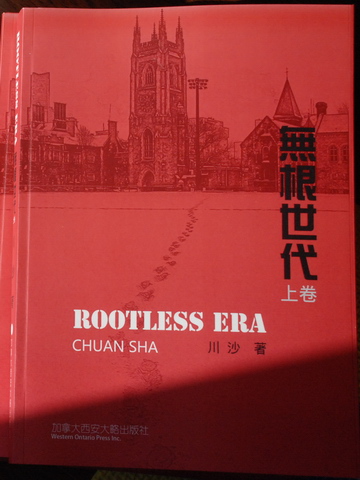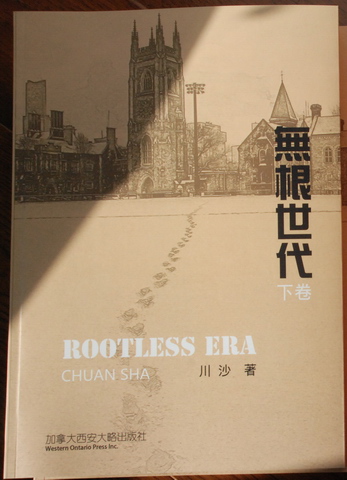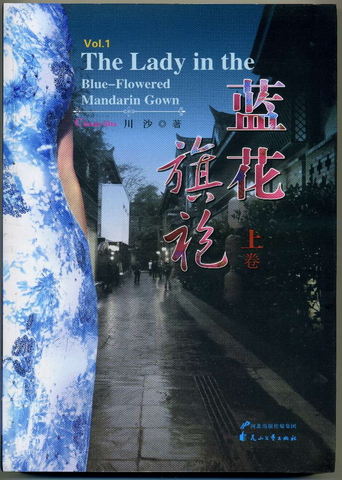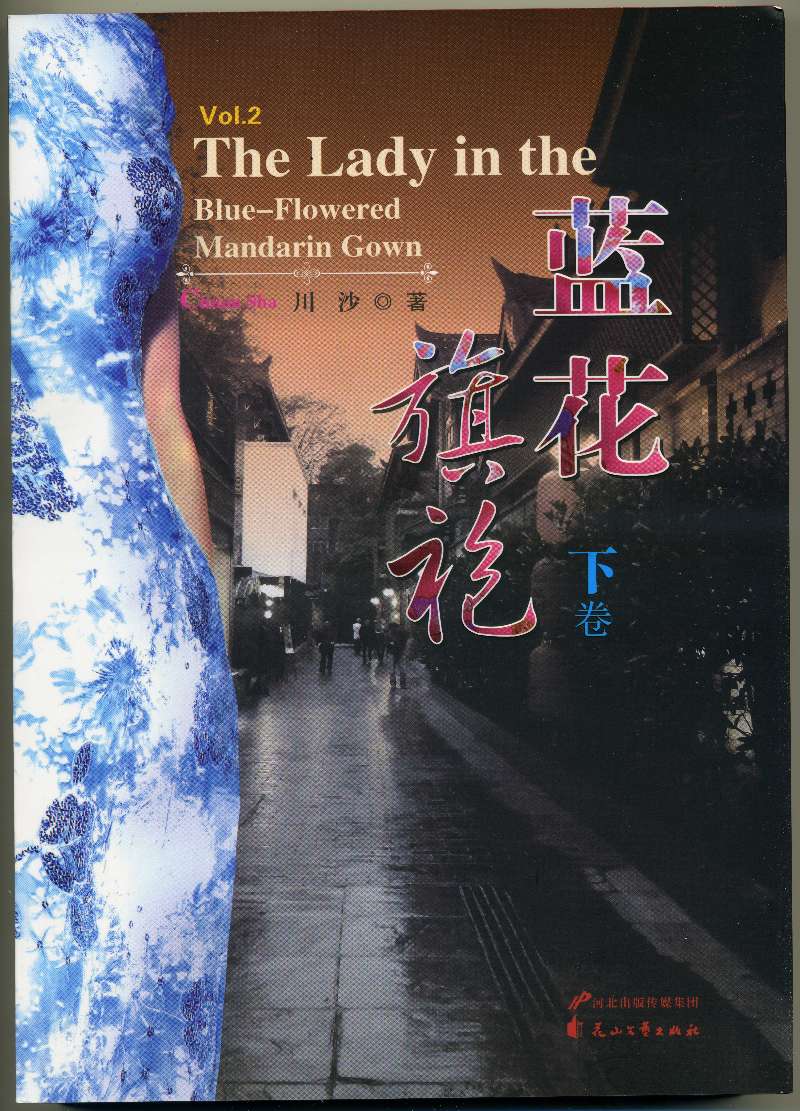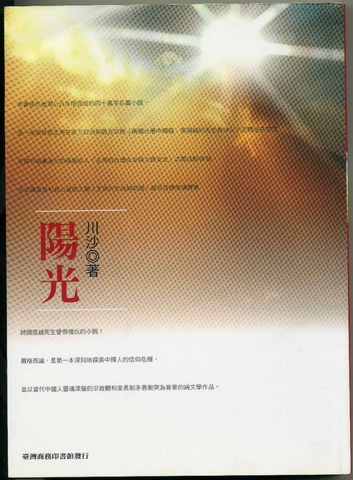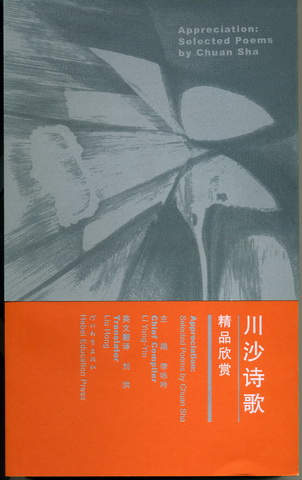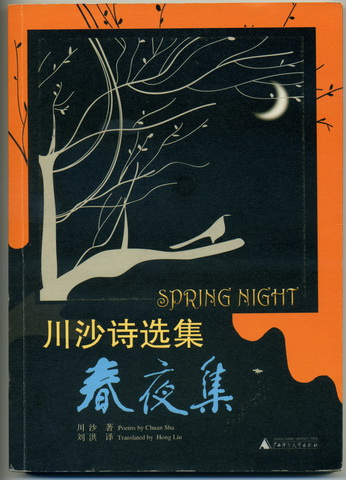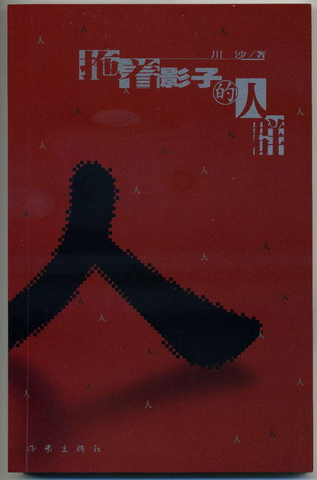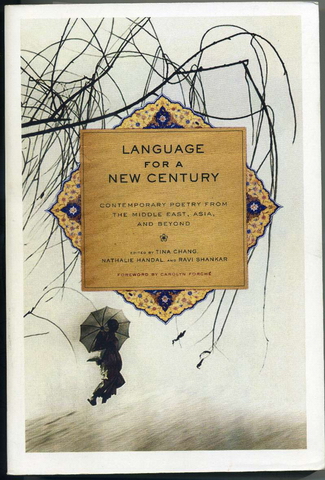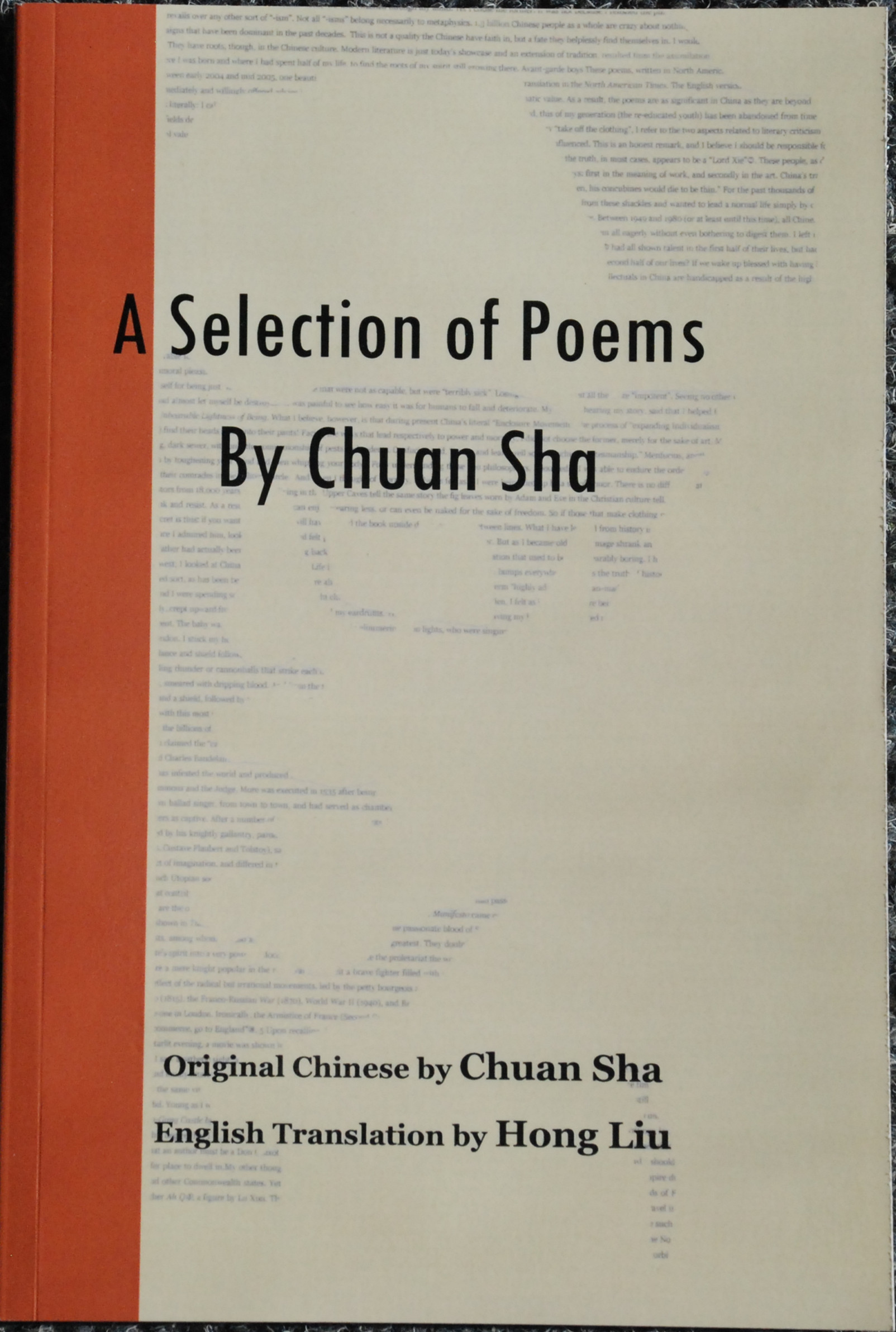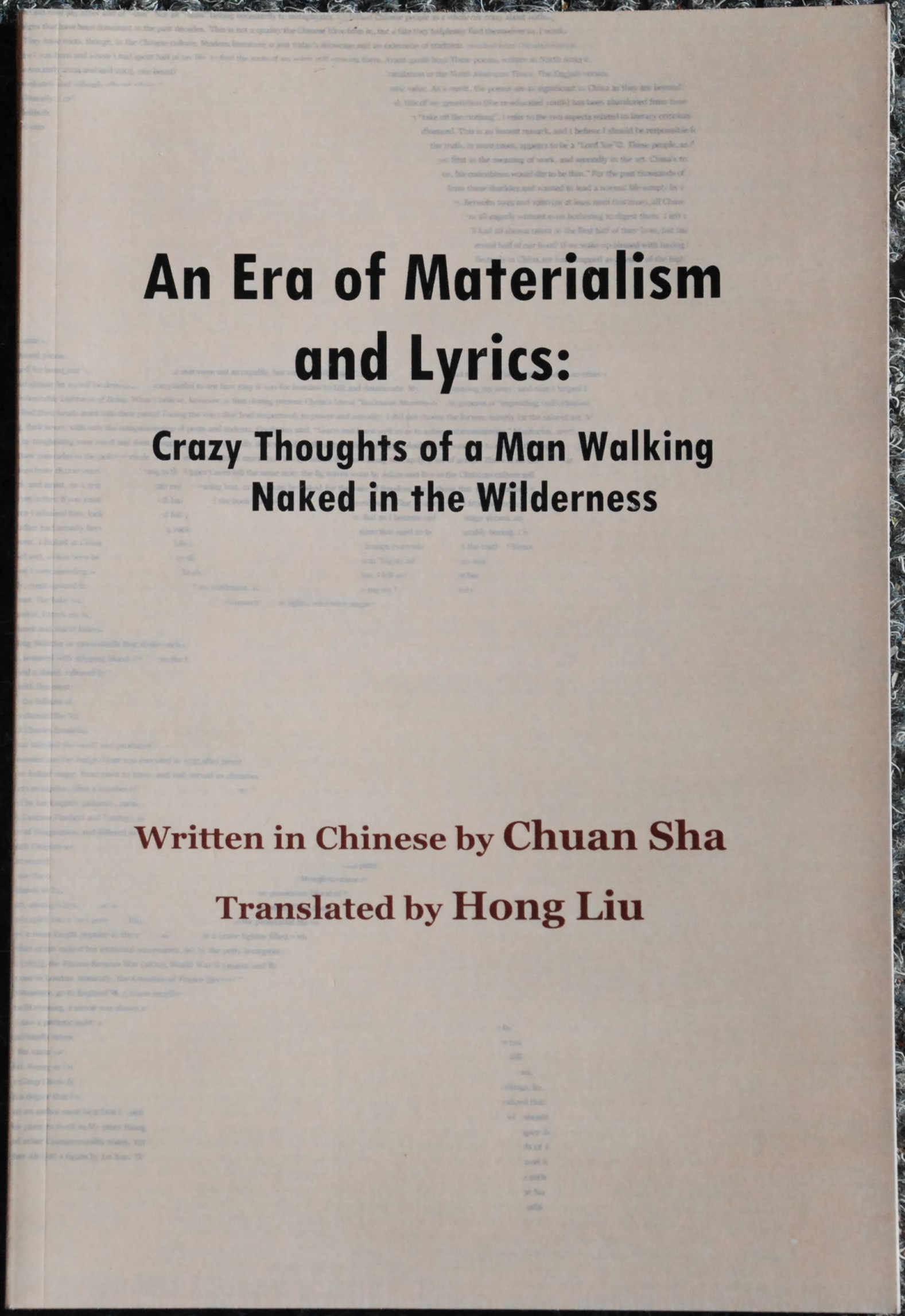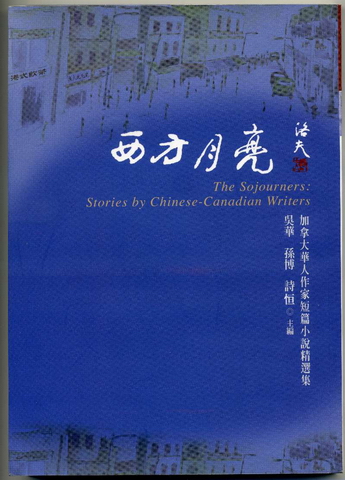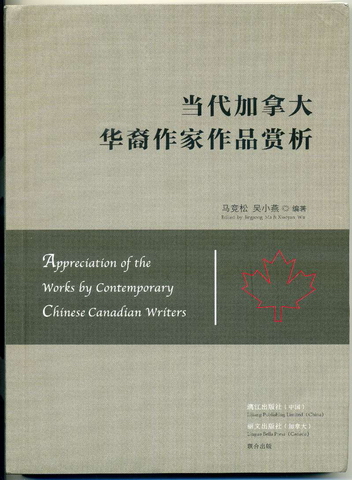An Era of Materialism and Lyrics
— Crazy thoughts by a man walking nude on the wilderness
Chuan Sha
Toronto, autumn of 2005
When I wrote “Materialism”, another word, “no-ism”, flashed through my mind. Yet I chose the former. It was not because I relished the pun (“material” and “no” share the same pronunciation in Mandarin), but because it is a reality in today’s China that “materialism” prevails over any other sort of “-ism”. Not all “-isms” belong necessarily to metaphysics. 1.3 billion Chinese people as a whole are crazy about nothing metaphysical, an instinctive reaction to the stagnation resulted from the non-materialized and non-human political campaigns that have been dominant in the past decades.
This is not a quality the Chinese have faith in, but a fate they helplessly find themselves in.
I would not draw a circle to confine the poems of this collection within the time and space of China, as it is not the exact truth. They have roots, though, in the Chinese culture. Modern literature is just today’s showcase and an extension of tradition, resulted from the assimilation and of cultures. Being a long-time overseas sojourner, I would look across the Pacific at night to my homeland, where I was born and where I had spent half of my life, to find the roots of my spirit still growing there.
These poems, written in North America and Europe, first appeared in Global Chinese Weekly and North American Times in Canada. For 15 months between early 2004 and mid 2005, one beautifully illustrated poem was printed weekly with its English translation in the North American Times. The English version was more appealing among native intellectuals, including college and university faculty members. They immediately and willingly offered advice in terms of language, so that the texts would have greater idiomatic value. As a result, the poems are as significant in China as they are beyond its boundaries.
Upon publishing, I would like to express my heartfelt thanks to Mr. Hong Liu, the English translator who from the very start poured his talent into this difficult project. His unique and graceful style, with his delicately insightful traits of the true meanings, presents a masterpiece in the translation itself. This bilingual collection would have looked completely different otherwise. My thanks also go to Mr. Luo Fuj, beloved poet and calligrapher from Taiwan, who wrote the Chinese character title for the book. Artist Mr. Wang Wei-jun deserves my special thanks, for his artistic illustrations have added charming elements to my poems printed in the North American Times. I would also thank Ms. Lo Lan, the art editor and designer. These three friends worked together to make the work a real piece of art for my Canadian readers. I would also like to thank Mr. Wei Dong, editor of Guangxi Normal University Press. His extraordinary taste and professional craftsmanship combined enabled this poetic anthology to be published in such a short time.
In particular I would like to thank the following friends who have helped bring this book into existence. They are: Mr. Ha Jin, Chinese-American writer, Dr. Luo Hui, translator, and Ms. Roo Borson and Mr. Kim Maltman, both Canadian poets. Mr. Qi Guang, Dean of Canadian Film Institute, successfully led his team into putting my musical “Songs of Skirts” on stage. The Chinese-Canadian Poets Association and several local television and broadcasting corporations and dance schools all joined forces and made the performance possible. I would like to thank these leading figures: Ms. Lin Yin (actress), Mr. Cheng Lu-yu (singer), Mr. Yu Xi (novelist), and the following performers: Ms. Qi Shu-juan, Ms. Wei Yin, Ms. Juan Zi, Ms. Lin Nan, Ms. Wang Yue, Ms. Chen Qi-tao, Ms. Ma Kai-lin, Ms. Yu Li-li, Ms. Zhang Xin, Ms Zhou Rui, Ms. Ma Mei-lin, Mr. Jin Dong, Mr. Guo Ran, Mr. Zhang Han-yuan, Mr. Huang Zheng, Mr. Fu Lei, Mr. Xun Yan, Ms. Tao Sun, Mr. Chen Gong, Ms. Zhang Hong, Ms. Du Li, and Ms. Qi Sha-ling.
I am grateful for many other unknown friends too. In their friendship, in their understanding of my work, and in their creative performances, I have found the beauty and glory of life. I will always think of them with gratitude.
Let us return to the subtitle: a man walking naked. Doubtless, it speaks literally: I call to take off all clothing, lonely in the openness of a wild land. As far as spirit is concerned, this of my generation (the re-educated youth) has been abandoned from time to time. Speaking “physically”, we were thrown from cities into the country, into wild fields defined by Mao as “a vast horizon”, wild fields of spirit. Would anyone challenge me on this? When I say “take off the clothing”, I refer to the two aspects related to literary criticism and art.
First of all, I declare that I am not a “good person” from the angle of traditional values. I would like to warn my readers who may read this anthology to keep alert so as not to be wrongly influenced. This is an honest remark, and I believe I should be responsible for my readers. However, refusal to listen to the truth has been deemed one of the worst human shortcomings. Whoever that speaks the truth finds it difficult to be accepted, and whoever that hears the truth, in most cases, appears to be a “Lord Xie”k. These people, as described in Anna Karenina by Led Tolstoy, spend half of their wisdom deceiving themselves, and the rest justifying their deceptions.
In literary reviews the significance of tradition shows in two ways: first in the meaning of work, and secondly in the art. China’s traditional politics and morality are best described in an old saying, “Learning that the king liked swordsmen, the Wu people rushed to practice martial arts, and because the king of Chu enjoyed slim women, his concubines would die to be thin.” For the past thousands of years, it has been a cultural tradition that the common folk do not wear garments on their free will. Our poor ancestors kept adjusting their clothing to the taste of their rulers. Whoever wanted to be free from these shackles and wanted to lead a normal life simply by choosing his own garments would feel guilty of being a “bad person”. From the artistic perspective, I have not been a “good person” at all. There were two periods of time in which I found myself put out of place. Between 1949 and 1980 (or at least until this time), all Chinese were the same, barely exposed to any source of literature, be it Chinese or foreign. From 1980 to 1991, the reopen door policy offered us a chance to learn about western poetic theories, and we swallowed them all eagerly without even bothering to digest them. I left my homeland in 1991, having been separated from my own culture, roaming strange lands. I have been thinking of this tragedy ever since. Great men of letters such as Lu Xunl, Shen Cong-wenm, and Mu Dann had all shown talent in the first half of their lives, but had been destroyed in the second half by political turbulence. Conversely, this tragedy hit our generation harder, and handicapped us in the first half of our lives. Here then comes a question. What can we do in the second half of our lives? If we wake up blessed with having half a brain, will our children be as lucky? They might have none at all! It is of course not only an issue of inheritance, but also a practical problem of the social environment. Broadly speaking, most modern intellectuals in China are handicapped as a result of the high political pressure. Scarred, they either have become “Aunt Xiang-lin”o who mumble of their suffering, or have changed, fallen, and rotten in an era dominated by materialism and neo-ism.
Wang Zuo-liangp, sighing about Mu Dan and his contemporaries, said, “The political ideology has killed all compassion.” He hit the nail on the head the same way as J. Brodsky. Talking about the troubling artistic life of W. H. Auden, the 1930’s English “socially-conscious” and “Communist-colored” poet, Brodsky commented, “Viewing the whole picture of modern society, an artist should be more than a bit of a reporting journalist, ready to sacrifice the depth for the width, and discard the future for the sake of today.” The two scholars shared the same view.
The choices are not many. One could become a “social poet”, ideologically strangled and distorted by “Scarred Literature”, devoted to political and social reforms. Or they could be taken captive by the assimilation, the intruding impact of the Western cultures. Finally, the “Post-pioneering poetry” in China wanders into the tunnel of materialism and individualism, an Intelligence-oriented awkwardness. They have become popular, the spell-bound, magic games of wording. We cannot tell how high this colorful poetic bubble, filled with the plagiarism of extremely mysterious nonsense, will fly through this so-called “prosperous poetic era”.
Poets, of all human, are more vulnerable to their living environments, whether those be miserable or favorable. The 1990s signaled the beginning of a “materialism” era. I was in China, grouped with some other overseas friends. We had wandered about aimlessly, indulging ourselves in all sorts of immoral pleasures. Like teenage boys who feel guilty each time after masturbation, I believed I had been flung into an uncontrollable and terribly wrong situation. However, I found out later that everybody else felt the same. We were sick! I was even beginning to hate myself for being just “fairly sick”. I envied those that were not as capable, but were “terribly sick”. Losing heart, I felt myself all the more “impotent”. Seeing no other way of escape, I set sail again across the blue sea. And I seemed to have woken up, startled at the fact that I had almost let myself be destroyed. It was painful to see how easy it was for humans to fall and deteriorate. My friends, hearing my story, said that I helped from another perspective enrich their understanding of the philosophy Milan Kundera had brought forth in The Unbearable Lightness of Being. What I believe, however, is that during present China’s literal “Enclosure Movement”, the process of “expanding Individualism” is a must. And the result of the procedure would be that “thousands of re-produced individuals” (Georg Hagel) find their heads stuck into their pants!
Facing the ways that lead respectively to power and morality, I did not choose the former, merely for the sake of art. My soul took me to a straight road, by which I mean I would rather die than see myself crawling along a zigzagging, dark sewer, with only the companionship of pests and rodents. Confucius said, “Learn and learn well so as to achieve statesmanship.” Menfucius, another ancient Chinese philosopher, also had a famous inspiration: “If Heaven entrusts you a great mission, it will begin by toughening your mind and then whipping your body.” Fully understanding these two philosophers, I doubted if I was able to endure the ordeals. My timidity when faced with any trials to obtain traditional success had disappointed and saddened my parents and their comrades in the political circle. And when I thought of morality, I always felt as if I were being tied up by a set of armor.
There is no difference at all regarding the history of garment wearing both in China and abroad. The animal bone needles made by our ancestors from 18,000 years ago while living in the Upper Caves tell the same story the fig leaves worn by Adam and Eve in the Christian culture tell. What a clothing designer really hopes is that no sooner have his clients put on the clothing than will they lose the power to think and resist. As a result, he himself can enjoy wearing less, or can even be naked for the sake of freedom. So if those that make clothing never bother to put it on, why should I? I am not that stupid. With much reading of history, I have discovered a secret. The secret is this: if you want the truth, you will have to read the book upside down, and read between lines.
What I have learned from history is almost the same as I have learned from reading my father. When I was a child, Father was a respected, perfect man. From a distance I admired him, looked up to him, and felt proud of having such a faultless hero for father. But as I became older, the image shrank and sank to the bottom. When my son who studied in a foreign country looked at me in a different way, I realized how ordinary my father had actually been. Yet upon looking back, I began to see the charm in his daily conversation that used to be so unbearably boring. I have found myself under the same spell of tradition’s power when I turned back from modernism. And when I returned from the west, I looked at China in a different way. Life is very much like the surface of the earth, with bumps everywhere. Such is the truth of history. Styles of cultures were man-made, meant for history to wear by force.
Humans by nature are but animals of a highly advanced sort, as has been believed because they are able to stand up on their hind legs. To me, the term “highly advanced” is man-made. Many other animals can stand up too, and by comparison are much lovelier and friendlier.
2
One fall night of 1991, a number of friends and I were spending some leisure time in a night club near Soho Square in London. All of a sudden, I felt as if my name were being called from somewhere. I heard blunt sounds, as if the bones and ligaments in the back of my neck were breaking. The sound, slowly but firmly, crept upward from feet until it almost cracked my eardrums. The first half of my life was leaving my body, like an ignited multistage rocket, its parts separating one by one. I saw myself as a new being, a baby with a human head and a wolf’s body; fresh, pure and innocent. The baby was crowded by people that were lit up in glimmering neon lights, who were singing, yelling, and dancing to the deafening beats of music. All was wonderful and fresh while the seemingly imaginary call kept falling from the starry indigo sky over peaceful London.
I stuck my head out of the window, to breathe in the damp air, only to hear the clip clop of fading horseshoes. At the end of the street, a dim lamp sputtered. I saw shadows, the shadows of the armored Don Quixote straddling his skinny old horse, brandishing his lance and shield followed by the stout, short Sancho Panza.
Their shadows seemed to be stretching, becoming lengthier and larger until they became a smear that connected the land and the sky. The clip clop of the horseshoes became clearer and more piercing, like rolling thunder or cannonballs that strike each other in the endless Milky Way. And from the depth of the echoes came the sobbing and weeping of billions of Asian spirits, pushing repeatedly into my ears.
The window’s steel frame bore the scratches of my finger nails, smeared with dripping blood. And from the top of my lungs, a long, trembling, wolf-like howl came up toward the empty street lined with sputtering lights.
3
I was stunned, frightened and helpless, facing the picture of Don Quixote on the old horse, brandishing a lance and a shield, followed by the round squire Sancho Panza who had been a life long victim. Yes, the reading of heroic knights from volumes of books, time and again, had enchanted the poor old man into a non-rational, non-human figure. Yet on that fall night, I was struck with this most incurable realization that the only fact to prove my existence was but the figure of Don Quixote and the increasingly deafening echo of the horseshoes. Otherwise, I was nothing at all in the real world, nothing but a shadow, and a most ordinary one amongst the billions of corpses that walk on earth, vanishing into their rotten doom.
Why?
What was it that connected a Chinese poet (and many more) with a Spanish knight of four hundred years ago?
Mikhail Bakhtin of Russia created a theory in “Novels of Dialogism” which claimed the “carnivalization of literature”. Julia Kristeva, French critic of post-structurism, emphasized on “Intertextuality”, and T. S. Eliot once said, “Immature poets imitate, mature poets steal”. Roland Barthes spoke of “Readerly Text” and its “Signifying Practice”, and Charles Baudelaire was the author of the famous quote, “Modernity signifies the transitory, the fugitive, the contingent, the half of art of which the other half is the eternal and the immutable.” Doubtless to say, the 16th century Don Quixote-type virus from Cervantes has infested the world and produced a large number of “Attic Knights”.
Research shows that this virus originated from Sir Thomas More, British humanist and author of Utopia. An occupant of important offices such as the Sub-Treasurer, Speaker of the House of Commons and the Judge, More was executed in 1535 after being accused of speaking out against King Henry VIII and the head of the Church of England. 12 years later in 1547, Cervantes was born into a Spanish barber-surgeon family. He moved with his father, a well-known ballad singer, from town to town, and had served as chamberlain in the household of an Italian cardinal. He had enlisted as a soldier and joined in navy battles where he was wounded, and was awarded medals. Upon returning home Cervantes was taken to Algiers as captive. After a number of unsuccessful escape attempts, he was rescued by his parents and returned home with pride. Some sources say that he stood out, taking responsibility for the escapes rather than betraying his fellow prisoners. The ruler of Algiers, touched by his knightly gallantry, pardoned him from penalty. Unsurprisingly, this period of Cervantes’ life formed his interior unity of Don Quixote and Sancho Panza. As a result, within the year of 1605, Cervantes, (so named “father of modern fictions” by Charles Dickens, Custave Flaubert and Tolstoy), saw the first volume of his Don Quixote reprinted seven times, and saw it sweep over Europe.
From history’s viewpoint, however, it was Utopia that brought forth Don Quixote. The two masterpieces shared the fact that both were a product of imagination, and differed in that Utopia spoke of humanity while Don Quixote was of literature. It is justifiable to say that the latter satirizes and romanticizes the story of the former. Unexpectedly, this powerful infection of fancy infested Henry de Saint-Simon, French Utopian socialist. And from 1770 to 1772, the virus infested three children born in succession: George Hegel of Germany (1770-1831), Robert Owen of France (1771-1858) and Charles Fourier of France (1772-1837). These three infants, in later years, would make great contributions that altered the humanitarian history of the world.
Almost half a century had passed before Karl Marx was born in 1818 in Trier, southern Rhine, Germany, into a Jewish lawyer’s family. The theories that act as the backbone for his two most famous works are the outcome of the humanity influence. On Capital and The Communist Manifesto came completely from previous scholars. His philosophic ideas, for instance, came from that of his fellow German Hegel. The fanciful passion to save the proletariat of the world, as shown in The Communist Manifesto, can be traced back to the same passionate blood of Spanish Don Quixote. And his thoughts on social economics were heavily influenced by the above-mentioned Utopian socialists.
4
The land of Spain has been rich in producing artists, among whom Picasso and Salvador Dali (1904-1989) are the greatest. They doubtlessly shared part of the Cervantes blood. Germany, another European state, has been known as the land where people are born inflexible. Yet when Karl Marx developed Don Quixote’s spirit into a very powerful doctrine with which to liberate the proletariat the world over, the passion without any doubt inspired and moved countless numbers of intellectuals who held the same dream.
If we think carefully, the character of Cervantes’s pen was no more a mere knight popular in the medieval era, albeit a brave fighter filled with renaissance and humanity. Tragically, his visions and valiant deeds brought nothing but disaster to the society and to himself. From this point of view it is not difficult to understand the effect of the radical but irrational movements, led by the petty bourgeois after the French Revolution, which swept over the world. I always feel that France carries the romantic gene, which runs through their blood with irresponsible idealism. Napoleon’s War of Waterloo (1815), the Franco-Russian War (1870), World War II (1940), and Referendum for Independent Quebec (1995), all ended in failure! Yet when you see The Carrousel Arch of Triumph in Paris, you cannot help but marvel at its splendor and grandeur, unmatched by the one in London. Ironically, the Armistice of France (Second Compiegne) was signed in 1940, with the French submission to Nazi Germany’s occupation of northern France.
I remember myself saying in an article 10 years ago, “To study art, go to France. For politics and commerce, go to England”s.
5
Upon recalling, I very often would have pictures of my early life in my mind.
When I was about four years old, I saw my father in an army officer’s coat, speaking to a day time military gathering in the county municipal stadium. In the starlit evening, a movie was shown in the open theater for the uniformed soldiers. After the movie, Father made another speech before the rows of army trucks, loaded with soldiers, roared away.
Another defining moment occurred after I had become an educated youth. I saw a pathetic sight: a peasant who once had been my father’s solider, clothed in rags, standing before the iron gate leading to the building of the county municipal government where my father had once worked. He wore all of his Medals of Merits on his shabby coat, and loudly uttered vehement curses toward the closed gate. I felt my heart bleeding. I had been reading Don Quixote and Tagore at the time.
Later on, I often felt that I wanted to see myself flying away.
I realized, upon writing this article, that I myself had been infected by the same virus from reading Don Quixote. I was in Grade 3 when a female classmate named Zhang Xiao-xin lent the novel to me. I still remember her pretty face and her pretty clothes, which gave me a beautiful impression just as the fine pictures on the book cover did. Young as I was, I could not help laughing wholeheartedly at the story. I read many other picture books too, such as The Story of Zoya and Shura, and Childhood, Mother, both by M. Gorky, as well as The War Among Three Kingdoms, The Story of Yue Fei, Taking Wa-Gang Castle by Strategy, and many more..
When I looked back, I found myself shadowed by the spirit of Don Quixote in my own writings, longing to save the world. I often felt ashamed, embarrassed and even scared for bearing in mind this ambition, sometimes to such a degree that I would emotionally lock myself in from the rest of my friends. Later on, when I began reading William Whitman, I realized that that was normal for a poet to possess, and in fact many great poets and writers do have the same passion.
Ha Jin even said that an author must be a Don Quixote, if not more. Of course, he refers to the imagination in the literary creation.
On that I agreed. So why shouldn’t I be another Don Quixote? The world touched by a fountain pen is much more immense, and seemingly offers a much safer place to dwell in.
My other thought has been that Don Quixote’s entrance into England changed the nation into the most powerful empire during the transience of the Victorian Era. The same prosperity followed its spread to the United States, Canada, Australia and other Commonwealth states. Yet an unsettled myth remains that the same Don Quixote had been transformed differently in the lands of France, Germany, Russia and the rest of Eastern Europe. And this well-known knight had been distorted in China into another Ah Qq, a figure by Lu Xun. This was even worse, though more natural, as I found myself a mixture of the both. When I began my travel in the United Kingdom, I felt as though I had returned to the earlier stage of fundamentalist Don Quixote’s time. I tried in vain to figure out how this change came to be. I decided later that England was closer to Spain. Well, who can tell?
Isn’t it a nuisance to have such transformation?
Undoubtedly.
6
One sunny afternoon in summer 1995, I returned my books to the library and then strolled toward north Edinburgh. From the intersection of Starbank Road and York Road, one could see the shore of Firth of Forth stretching along the North Sea. The sea was endlessly blue, and half-naked men and women lay on the sand, like fish that emitted some sort of light. Once again I was seized by the feeling that my life was escaping from the frame of my being, like a multi-staged shuttle roaring upward into orbit, each of my rockets breaking off one by one…
An image flashed in front of my eyes, nearly making me scream. Immediately I covered my eyes with my hands.
This was what I saw:
Among the humans lined up as “white fish” in the sunshine or under their colorful umbrellas came suddenly a huge black 3-foot long “mermaid”. It hung in the air like a spindle, flapping its fins, supported and guided by invisible buoyancy. When I looked closer, I found this “mermaid” shockingly different, fossil like and scaled, as if it had come from outer space, or from the depths of water that had never been touched by sunshine! The fish paused about five meters away from me, to stare at me. I looked back hard, frightened at seeing my own face reflected in its face! We recognized each other! It appeared timid and scared. Water dripped continuously down from its body and from the water plants that hung from its moss-covered head and many fins. Tilting its head, it looked me up and down, as if to read me, as if I were an image beyond its definition of time and space. It nodded at me, and from its open mouth came an unearthly sound, seemingly of laughter. Then it struggled quickly to move its gill covers, as if having difficulty breathing, before it tilted its head toward the sky and uttered a long, broken howl. The sound made ripples in the water, each larger than the next in the sunlight, until the mermaid disappeared into the distant horizon of the sea.
As my eyes followed it, I felt as if my whole self were disappearing too. What a truly terrible loss. On the other side of the Pacific Ocean, the bottom of which connected to the Atlantic Ocean I stood by, was my hometown.
At that moment, I had the feeling that the thing named “Myself”, among the crowds of people sunbathing on the beach, was nothing but an illusion of the mermaid that had vanished into the sea.
I had become nothing at all, not a thin sheet of paper, nor even the casual scrawl of a word upon it. I was but an illusion of the past, which, by mistake, was being reflected into the present.
And it was on the beach that I found the following passages flashing through the creases of my brain, the wording of which I associated with the scene I had just witnessed, forever imprinted in my mind.
If an aquatic animal with respiratory gills is thrown suddenly out of water onto the air-filled land as a result of a natural disaster such as an earthquake or a volcanic eruption, it will undoubtedly become afraid, and marvel at its miracle survival in its new surroundings. The animal will become uneasy, as it is not breathing by means of its gills, but by its nostrils, and it will be unaccustomed to the freer movement of land without the pressure of water. Without the support of the water’s buoyancy, the animal will become all the more afraid and uncontrollable. If this animal had a brain, it would have to think with it now. If it had any capacity to remember things, it would have to use it now. However, as it was born and bred in an underwater environment, it had become accustomed to a life very much like the existence inside a hardened shell, meaning that it had lost much of its free-thinking ability. The machinery of its mind has been downgraded, or shrunk like that of an underdeveloped animal, and has become like the hidden end of the human spine columns, or like our third eyelid, unseen within the corners of our eyes. This ability could even be like the blind gut from our digestive system, or like the third eye that exists right above our normal pair, as described in Buddhism and Taoism. In a nutshell, he has barely any thinking capacity. Yet he can remember, and he passes his days like an old man by recalling the past.
On that summer afternoon of 1995, he awoke from his deep slumber, astounded at what met his eyes when he looked around. On the vast green layers of land along the two sides of the Atlantic gathered his own species. They were like clothed beasts: charming and cruel, lovely and hideous, and making a great deal of noise. Radio and wireless internet had been directly connected to their nervous systems. They walked in outer space, reformed their own natures by reforming human DNA. Yet the bloodthirsty element of their nature had expanded so that they replaced the rifles they had used for over 100 years with atomic bombs, hydrogen bombs, and neutron bombs! The sudden realization chilled him: that he was living on the edge of a nuclear war that could destroy all. And it was all due to the development of human wisdom gone astray. But then he felt relieved, and amused that the richer and the stronger (especially those that he knew well) would be buried with him. He felt sad too, that the poorer and the weaker would die as well. But in the end he did not really care. He was bored with living, though he was not bold enough to plan a suicide.
From that day on, I began to notice the clouds, magnificently crimson, capping the Edinburgh Castle. And I began to hear the nuns singing at midnight from the spikes of St. Giles Cathedral. I seemed to see Walter Scott, from within the monument named after him on Prince Street Gardens stand up and take a walk with his dog. The moonlit street echoed with his voice, reciting his poems. Suddenly all that had puzzled me for so long with their overly academic quotations came to exist as part of the vivid, clear life around the capital city of Scotland: the “Unity of Being” by Yeats, the anti-poetry perspectives of natural and social sciences favored by W. H. Auden, “Escape from Personality” by Eliot, and others. All that I had gone through, individually and socially, mingled with that of others, flooded into my mind and forced me to take up a pen. I followed my pen on the paper and it was like beginning a long march. I would write from dusk till dawn, aided by strong coffee. One cup, two cups, then five cups, until the doctor’s warning pounded in my head:
Stop! You must stop!
For almost a year I stopped reading and writing. It was the year that I became terribly sick at the sight of words, especially those in poems, which, I believed, stress my weakening heart. And it was that year that I did all I could to avoid reading any poetry, let alone those by Chinese poets. In a way, the task became like that of dodging walking corpses.
7
Western poetry, with T. S. Eliot and R.M. Rilke as representatives of two different trends, entered China again after a long absence of 30 years due to the efforts of Chinese poets Feng Zhi and Bian Zhi-lin. Yet these two Chinese poets, once acclaimed for their gift, found in them no more inspiration after their confinement in a labor camp. The one most trusted to fill the gap was Luo Fu, a gifted student of theirs. However, Luo Fu and his fellow poets in Taiwan were separated for a long time from access to any possible nutrition in terms of Chinese culture, and had thus become a completely different and rootless sort of self-creation. They had little to do, fundamentally, with the contemporary literature typical of the mainland.
In the mid-1980s, Li Jiang Publishing House in Guilin began the wonderful job of introducing western poetry into China. Among those introduced were Boris Pasternak, T.S. Eliot, and Ezra Pound. In 1987 when I first met Mr. Liu Shuo-liang, Editor-in-chief, he told me of their plans to publish anthologies of poetry by Bei Ling, Xue Di, Bai Hua, and Ouyang Jiang-he, respectively. All were popular Chinese poets. Bai Hua, in one of his letters to me, expressed his frustration in proofreading his own scripts before publication. In the same year, I was fortunate enough to meet some elderly translators such as Zhang Ying-lun, Lu Tong-liu, Fang Ping, and Wang Zhi-liang. Whereas they praised the early translations of Zhao Luo-rui, Ye Gong-chao, Bian Zhi-lin, Cao Bao-hua, Yang Xian-yi, Cao Ying, and Zha Liang-zheng, I could feel as a young journalist their worry that the translators, poets and writers of younger generations were “under nourished” by the classic literatures of both home and the rest of the world. In summer 1988, while in Dun Huang, I was amazed to find two Americans who in fluent Chinese were capable of discussing with me the mythological novels popular in the Ming and Qing Dynasties. Their level of knowledge of the classical Chinese language was quite as high as that of our university-level Chinese majors.
I had not been able to make sense of all this until a decade later, when I was talking with Luo Fu at his home about the vacant gap between 1949 and 1980 regarding the development of Chinese poetry. It was only then that I received a clearer and more thorough understanding upon the issue.
It was obvious that the symbolic writings of “Misty Poetry”, the sensational trends of schools such as “Fei Fei” and “They”, and other advanced trials had shared fame in their contribution to the poetry movement. And it was also obvious that the contemporary Chinese poets were quite “nutritionally deficient”, especially classical literature. They gulped down what they could find, so long as it had something to do with the western trend, including poorly-translated poems and poetic theories. As a result, they suffered from terrible heartburn.
What was more ridiculous was that these poets would put a great deal of emphasis upon classifying groups, spreading the influence, and fighting for certain titles. The competition could be fierce. Schools were graded with names such as “The Pro-Eighties”, and “The Misty Era”, giving the impression that they were again in the “Revolutionary Era” (or rather a feudalist period) during which army officers were ranked by seniority, and marked with “The Red Army”, “The Yan-an Era”, “Whampoa Military Academy”r, and so forth. These poets forgot that the true essence of literature is beyond the reach of Time.
8
Upon entering any bookstore or library in Europe or in North America, you will find with surprise that the most popular are filled the works of Emily Dickinson (1830-1886). She was one of the quintessential poets of the 19th century, but her works amazed the literary world of the 20th century. She wrote more than 1,700 poems, only a handful of them published during her lifetime – all anonymously. Her idiosyncratic vocabulary and imagery combined created a unique lyrical style that best fitted her lonely inward search for an unknown tomorrow.
For the past one hundred-plus years, Emily has been remembered as a great American poet who wrote for the future, and who found much in her solitude. But have we ever tried asking which “poetic school” she belonged to in her time, or naming her our “Queen of Poetry” in the world’s poetic circle?
At present we have had many authors who have put much of their time and energy towards leaving behind their names (whether or not they be carved and gilded upon their tombstones) so that they will live an eternal life. But oh, dear “Masters of Poetry”, do you have any idea what everlasting poetry really is? When you think of Emily Dickinson, a humble recluse on the other side of the Pacific, do you feel ashamed of yourselves?
I am sure that Emily Dickinson has also been a faith (if poetry is religious) accepted by those who write poems independently, a solid point for them to build confidence upon, and a hammer with which to smash all the seemingly strong idols!
Literature, poetry included, has the characteristic of “immortality”. The question is how it can be. A poem can be immortal because the best part of it, if not the whole, comes from the most profound source of its language, and thus is remembered through generations. This is the ambition of all poets. Immortal poetry has the power to touch and to conquer. Touching poetry is a stream that flows through the barren wilderness of human hearts, toughened by thousands of years of storms. The stream is the “live water” as it winds through space and time. Ancient peoples had the same feeling we have. If the “live water” ever moved them, it can surely touch us, and touch our children of many generations to come, throughout wars and peace.
It was part of the Chinese culture and terrible custom for nobles and commoners alike, that the living built their tombs before they died. Even from today’s media, there are reports of some corrupted official building a large graveyard for either himself or one of his living relatives. In present-day China’s literary circle, a few poets are doing the same thing. They select themselves from a nomination committee that they have set up, and they place their names on the top of the list in a magazine that they themselves edit. What a deed! They never seem to realize that a true poet will be remembered only by what he writes, from the past to the future. This has been proved both in the East and West from the history of literature.
In ancient China, many poems and ballads were written anonymously, or even by housewives who lived on the bottom rung of society. The wonderful love ballads and songs that have been carried down from the Tang Dynasty, a period known for its brilliant poetic creations, will surely be carried on into the future. In the 26th year of Emperor Guang-xu’s Reign in the Qing Dynasty, archeologists discovered five hand-written scrolls made in the Tang Five-Generation Dynasty in the Mogao Cave of Dun Huang, Gansu Province. The scrolls had poems and songs from the 7th to the 14th centuries, quite a few of which were strictly metered by patterns such as “The Buddhist Theme”, “The Stream Sand”, “Look beyond the South River”, and “The Chirping Birds”. The passion and strength of these poems have lived on, until today’s cold and indifferent world have snuffed them out. Can this kind of passion and strength ever be found in any of the unintelligible lines of nonsensical text by the so called “advanced and experimentalist” poets?
Our great poets are willing to be alienated, to be treated as special by society. However, they must keep in mind that this self-alienation cannot push the boundaries of reality in their poetry so far that the common folk do not understand it. To quote Luo Fu, “The philosophy of poetry centers on images, as only images will offer a chance to see the world truly as it is.” After all, we do not write poetry for fairies or spirits but for human beings. The reason I quote this statement is that I had such an experience in the early 1980s in China. In 1990 I set foot in England, and saw with my own eyes a completely different thing from the picture I had in my mind. The sandwiches, forks and knives on the table; the blue-eyed, blond residents with a unique air. Signs and commercial boards were seen everywhere while people, wearing crosses that symbolize the crucified Jesus Christ went to churches, from which bells produced resounding, echoing chimes. The Prime Minister was met with flying eggs and tomatoes on his tour along the street. People spoke to each other with extraordinary honesty, and in some cases even naivety.
9
We live in a “contemporary” period of time, but what about the things we write? Are they contemporary as well? Present-day literature is in the middle of an unprecedented period which will see no repetition. This anti-literature era is the period that forms a big gap between the past and the present. We have not only lost the traditional culture; we have done extensive damage to it. We have failed to build up the modern culture from the base of tradition. From this perspective, it is not an exaggeration that we, preoccupied with trashy poetry and novels as we are, have wasted and are still wasting good construction material!
In this era where “Pro-ism” prevails, I prefer to choose the road of classics, even if it would take my lifetime to digest the classical nutrition, and even if I would have to walk naked and alone because this is the road closer to the common folks. If I were never able to move myself, nor face myself honestly, how could it be possible that I could create a new image and show it to others? In other words, I would hate to be unreasonably bound by the new clothing labelled “modernism”.
I could still feel the burden upon my chest as it followed me down the narrow lanes and streets that zigzagged through the stone houses and flats of London; the houses that looked decayed, rotten. I seemed to have walked back into Mid-19th Century England, as it was in the black-and-white movie of Charles Dickens’ masterpiece David Copperfield. Only then did I begin to understand the background of European modernism, to understand why F. T. Marinetti, in his Manifesto of Futurism, relentlessly cursed Italy by saying, “We mean to free [Italy] from the countless museums that cover her like so many graveyards… Museums: absurd abattoirs of painters and sculptors ferociously slaughtering each other with color-blows and line-blows the length of the hoarded walls!” (Just imagine the eyes of those thousands of artists looking into yours, and producing the same force of oppression I constantly felt as a boy when my father, over 30 years older than me, ceaselessly lectured me.) I began to understand why A. Breton, along with L. Aragon, Paul Eluard and Max Ernest, led an art movement in which they featured their Futurist principles in “automatic writing”, “free choice of wording”, Dadaist “unconscious creation”, and some other unconventional techniques such as “word games”, “phonetic secrets”, “bird languages”, “lexicological revolution”, and “alphabetism”. Yet these scholars had gone a bit too far. After several decades of fame, this movement came to a collapse with the death of its leader L. Aragon. However, modernism has contributed positively, and its movements have eventually flowed into the main stream of literary tradition in “museums”, as an inseparable part of the classics. The concrete objects representing the trend are on display in Paris’s Centre Pompidou. Frankly, quite a lot of these paintings and sculptures on exhibition would lead most viewers, those from Asian countries in particular, nowhere. They are but garbage!
10
Science is thus named because it provides a rule based on certain standards. In physics, there is a term “Eigenvalue Error”, which refers to the differences produced by a single instrument. To standardize the rules, a generally accepted judgement must be applied.
In the fields of natural sciences there are standards for time and space. For instance, the Royal Greenwich Observatory, built in 1675 during the reign of King Charles II, ruled that the solar time of the meridian at this observatory was the basis of Standard Time. So for most of the world, the time is Greenwich Time, and the meridian is the “Prime Meridian”.
In social sciences standards for laws are The Code of Hammurabi found in Iran in 1901, Napoleonic Code which was published in 1804, and The Constitution of the United States of America completed in 1787.
Russian authors of the late 19th century, Tolstoy, Chekhov, and Tostoyevsky among them, presented many legal terms and scenes like “Courtroom”, “Jury”, and “Juror”. There were detailed descriptions in light of laws and regulations of “crime and punishment”, of moral concepts, and of the pursuit of peace of conscience. The detailed description and lengthy discussions showed that the laws were far from being standardized, yet the Russian society was beginning to take the step. Let us turn back to look at China in this same period of time (1851-1909), ruled respectively by the following four emperors: Xian Feng, Tong Zhi, Guang Xu, and Xuan Tong. What sort of judges did we have? If you carefully read Flowers of the Doom by Zeng Bu, The Weird Phenomena over the Past 20 Years, The History of Misery, Nine Lives Case, and Sea of Hatred (the latter four by Wu Yan-ren), you will find that all lawsuit cases were reliant on one symbol of justice: Judge Bao the Blue Sky. There was no such a thing as a jury, but whipping was the penalty.
Western countries, feudalistic Russia included, provided places such as churches, where judgement was served of morality and conscience beyond laws. In China, however, the laws were regulated and carried out in accordance with Buddhist and Daoist practices, and had much more to do with families and clans. In The Mistress and the Concubines by Su Tong (a novel about republican life at the beginning of the 20th century), Mei Shan, a Peking Opera performer, was killed by cruel family law punishment: the male servants threw her into a well! The judge was Master Chen, the head of the family who had five wives, and the “Enforcement Staff” were the servants!
Aristotle’s Theory of Tragedy argued that the story’s contents were the soul of a tragedy, while Hegel’s theory emphasised that the centre of a tragedy lies in the conflict of ethics. Theories emphasising the errors of the characters on the synthetic contexts of the story or on the purification of tragic effect all meet in the centre of ethics. Later developments have brought forth other schools known as symbolism, existentialism, and “absurdism”, as represented by Schopenhauer and Nietzche. However, these modern theories of tragedy display a very similar spiritual core with what was set up by Aristotle and Hegel. The essence of ethics in a society finds root in the field of cultures, and, more deeply, in religion. Laws and rules are the true showcases of ethics, which are comparatively stable and specific. The state machinery, such as courts, judges, jury, lawyers and prisons, act as companions to laws and rules. State machinery, under the noble air of tragedy, works as a symbol of punishments of all sorts and scales against the common everyday. Punishments and penalties from the law or behavioural rules tend to show fairness and equality by touching onto what is beyond the soul and the conscience. Only cultures and religions would touch the soul and the conscience. The former has everything to do with the external well being and the latter the internal. It is quite common that in a normal, healthy society, a self-disciplined man will feel guilty both externally and internally though he is not a convict, and may commit suicide as a result. However, in a less civilised, unhealthy society, the criminals show no penitence, nor would they bow to the law. Some may as well make a public declaration: “Look out, citizens! In 20 years I will return a hero!”
11
In my mind, a society rich in the literary air of poetry is, by comparison, mature, healthy, science-oriented, and appreciative of tragedy. This tragedy includes benevolence, morality, ethics, expectations for the noble and triumphing, and the essence of Dionysian tragedy. Fundamentally, it seeks morality and order for the universe, to care for the inner existence of mankind, and qualities of this existence: freedom, harmony, beauty, and peace. There is mutual understanding within the society what a tragedy really is, and how far and deep the tragedy reaches. This society will also remember all that is related to this tragedy. A society that goes the opposite way will understand nothing of this. As a result, even tragedies on a large scale would be forgotten in a short period of time. You cannot blame it for its folly. It forgets because it is not a mature and healthy society. It becomes weak.
12
Sometimes I feel like writing poetry purely out of rational, intellectual, peaceful and sceptical wit. Yet I enjoy even more writing poems with themes of romance and idealism. In the same way, I love sculptures by Rodin. Through my sojourn of England, it did not stop me at all from enjoying the less-dimensioned works of Henry Moore, such as Reclining Figure, and King and Queen. Before Moore there were other modernist sculptors such as Epstein, Brzeska, Brancusi, and Picasso. Their masterpieces indulge viewers with a purer air of art and holiness. I seemed to have seen from the ambiguous, delicate, and touching curves traditional reflections in the gazes of Michelangelo and Raphael. I could also see “Noble simplicity and quiet grandeur”, as stated by German art historian Winckelmann, who marvelled at the beautiful stone “Venus from Melos” in the Louvre. I love Manet, Monet, Renoir, Fontaine, and Claude, yet my heart holds a special place for Cezanne, a post-impressionist in “Meet in Thursday”, and Van Gogh, a lifetime pariah who had failed to be classified.
The most important part of Chinese classical poetry was the lyrics. From Classical Poetry, Li Sao, to poetry of Tang Dynasty, Song Dynasty, and Yuan Dynasty, and to the outstanding representatives of the modern world such as Ai Qing, Feng Zhi, and Mu Dan, they provided gateway to passion. Ancient lyrical masterpieces are the Old Testament, The Egyptian Book of the Dead, and The Vedas of India. Among the many well known poets there were quite a few lyrical masters such as Neruda, Saint-John Perse, Odysseus Elytis, O. Mandelstam, Pastenak, Tsvetaeva, Akhmatova, Dylan Thomas and W. H. Auden.
Western theories of poetry argue that poetry is essentially physical rather than mental. That is poetry tells of human feelings instead of human wisdom. The ancient Chinese poets thought likewise.
I believe mankind holds a secret: romantic impulse and a yearning for holiness. This passion reveals the deepest corner from which mankind longs for a everlasting realm of paradise. Poetry is religion, its totem being the most primitive passion ever hidden in humans. Therefore, it is my hope that my poetry will be close to the core of classicism, or tradition. I chose the word “close”, because writing itself is, after all, a self-disciplined, isolated, “individual action”. And this “Individualist” is a modern man, therefore all his expressions are modern and specifically “individual”. On the other hand, lyrics are not the sole element in a poem, and are not necessarily dominant throughout the poem. There are other components, like storytelling or drama. What I wish to see are modern lyrics from the richness of extensive classics. And the lyrics are shared with universal values. For example, as a resident in Canada, I always find my memories of China (which serves as the core of my passion) clinging to my everyday thoughts. Yet what I see every day is a mixture of people from more than a hundred different cultures. Canada is a true global village with future significance. Qian Zhong-shuu, modern Chinese scholar, once predicted a community in which “Eastern and Western Seas share the same source, while Southern and Northern Schools of Learning are not separated by a strategical mindset.” This is my hope as well. The feeling hidden in the deepest soul of poetry should be primitive. Passion is the core of poetry, the source of all sentiment. No matter what means it is we use to reach our destination, whether they be riding a donkey or taking an aeroplane, we are humans that always find in our inner souls a primitive, “utopian surge of passion”. This passion touches us so that we believe, without doubt, that beyond the remotest tip of life there is a utopia to look forward to, the expectation that blesses our daily life, especially in those moments of despair, and purifies our souls, letting us face reality once more.
Balzac wrote on the stock of his walking stick: “I surmount all obstacles.”
Kafka wrote on his walking stick: “All obstacles surmount me.”
They had that “all” in common.
As a solitary individual, as well as a plural form reflecting many and many more “me”, I walk, with the support of my own stick, in the pure and obscure air of the black night, along the path to the Moon.
Note
1 Luo Fu (1928 – ), penname for Mo Luo-fu, a well-known poet from Taiwan.
2 Lord Xie: a character in a tale from Han Dynasty. Lord Xie loved dragons so much that dragon images were seen all his house. But when a real dragon came to pay him a visit, he ran away in fear.
3 Lu Xun (1881–1936), a major modern Chinese writer, regarded as the Father of Modern Chinese Literature.
4 Shen Cong-wen (1902-1988), one of the major modern Chinese writers popular before the founding of the People’s Republic.
5 Mu Dan (1918-1977), one of most important poets of 20th century China.
6 Aunt Xiang-lin: a character in Blessings by Lu Xun. She has become the stereotype of those who mutter of own misfortunes.
7 Wang Zuo-liang (1916-1995): poet, professor of English Literatures at Beijing Institute of Foreign Languages.
8 Ah Q: Main character in Lu Xun’s acclaimed novel The True Story of Ah Q.
9 “Yan-an Era” refers to the period of time when Chinese communists, led by Mao, governed its own basis in northwest China during the Anti-Japanese Invasion War (1937-1945);
“Whampoa Military Academy” (1922-1938): a military academy founded by Dr. Sun Yet-Sen. Most of the high ranking Nationalist and Communist officers received training there.
